 Are you looking for an asphalt Basketball Court contractor in Suffolk or Nassau County NY? Gappsi offers a variety of Sports Game Courts to make the perfect addition to your home, school, business, club, or organization! Choose from a full-basketball court, half-court, or just the key; we have the court to perfectly match your space.
Are you looking for an asphalt Basketball Court contractor in Suffolk or Nassau County NY? Gappsi offers a variety of Sports Game Courts to make the perfect addition to your home, school, business, club, or organization! Choose from a full-basketball court, half-court, or just the key; we have the court to perfectly match your space.
With summer on its way, kids will start to have fun with their favorite hobbies outside again. For an outdoor sports game court that’s sure to please, team up with the professionals at Gappsi.
LET US BUILD YOUR BASKETBALL COURT TODAY
The most affordable option for having a basketball court is an asphalt pad with painted lines. Gappsi specializes in hard court (asphalt) construction of basketball courts. Hard courts are the most common type also. They are highly durable and can withstand heavy underfoot traffic. The bounce of the ball is also much more precise on hard courts. Hard courts usually use asphalt or concrete. The downside to hard courts is that they are less forgiving on your lower joints (ankles and knees).
Clay courts provide more cushioning for joints and are easier on the body overall. However, they are much more slippery to play on than hard or grass courts. They are also dirtier than other court surfaces.
Grass courts are easy on the joints of the body. The ball also bounces quickly off grass tennis courts. Grass tennis courts are harder to learn the game on and playing on them requires a certain level of skill.
 Our courts are high-performance, low-maintenance basketball courts. Made from the finest high-quality materials ensuring longevity as well as durability. Our team of professionals utilizes the latest cutting-edge processes to preserve the integrity of the asphalt base and guarantee the highest quality of the court surface. Gappsi courts also require minimal upkeep.
Our courts are high-performance, low-maintenance basketball courts. Made from the finest high-quality materials ensuring longevity as well as durability. Our team of professionals utilizes the latest cutting-edge processes to preserve the integrity of the asphalt base and guarantee the highest quality of the court surface. Gappsi courts also require minimal upkeep.
What Type of Paint Can You Use on Asphalt Sports Game Courts?
Asphalt sports game courts, such as basketball courts, tennis courts, and athletic tracks, require a specific type of paint that is durable, non-slip, and can withstand harsh outdoor elements. The paint used on these types of surfaces is specially formulated to provide excellent adhesion to asphalt and offer the necessary properties for sports activities.
Several types of paint are commonly used on asphalt courts, each with its unique properties and advantages.
- Acrylic paint offers excellent durability and non-slip properties, while latex paint provides flexibility to withstand temperature changes.
- Polyurethane paint is highly resistant to abrasion, and epoxy paint offers exceptional durability and chemical resistance.
- Thermoplastic paint is primarily used for line markings and provides excellent adhesion and longevity.
By selecting the appropriate type of paint for a specific court, you can ensure that the surface is safe, durable, and visually appealing, enhancing the overall playing experience for athletes.
Why Build a Home Outdoor Basketball Court?
Constructing an outdoor court is a major financial investment, but it’s well worth it.
- Property value: Any exterior hardscaping you do can improve your property value, and this is certainly true of adding an outdoor court. As long as you maintain its appearance, your court can increase your resale value by anywhere from $10,000 to $20,000!
- Convenience: Playing basketball on the hoop in the driveway can work just fine. However, constantly moving cars out of the way gets to be a big pain after a while. Installing a dedicated outdoor court gets rid of that headache for you.
- Safety: A ball rolling from the driveway and out onto the street can be very dangerous, especially if you live in a high-traffic area. A strategically placed outdoor court ensures the ball never rolls down into the street or near any passing cars.
The Best In-Ground Basketball Hoop On The Planet! Dominator Basketball Hoops
- Easy Installation – With only 4 components to assemble (Backboard, Rim, Overhang arm, and Main Pole – Making the full installation of the hoop extremely simple.
- Rust Proof Build – Built with 6061 T6 aluminum which prevents rust and allows for ultimate performance in all weather conditions.
- Engineered with Precision – The Dominator is just built differently. There’s no other way to say it.
- Telescoping Height Adjustment – The Hoop easily adjusts straight up and down making the distance to the rim the same no matter what height the hoop is set at.
We don’t just build rugged outdoor sports game courts; we also provide several repair services for maintaining the condition of your asphalt court surfaces year after year. That means you can call on our paving contractors for all sorts of outdoor court solutions, including:
♦ New Court Construction ♦ Asphalt Repair ♦ Court Resurfacing ♦ Court Replacement ♦ Line Painting ♦ Sealcoating ♦ Cleaning
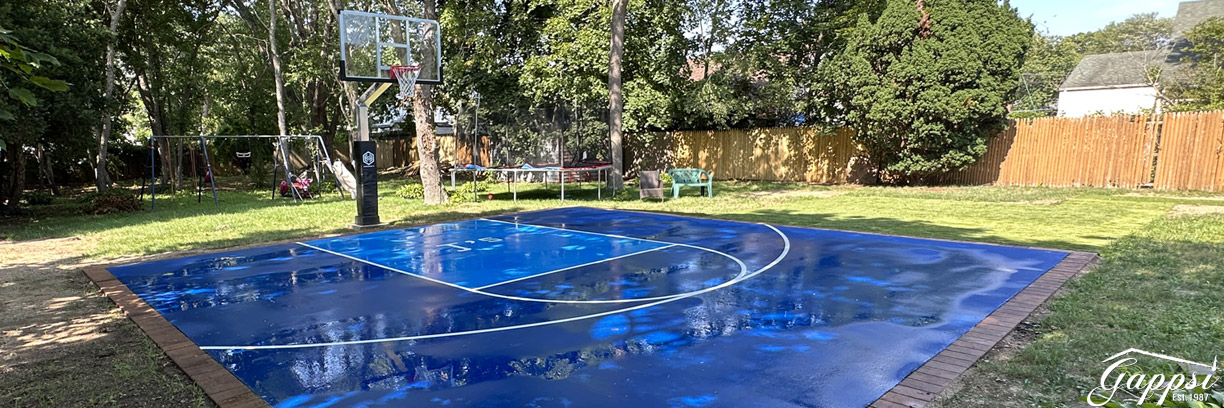 Whether you’re in the market for tennis court builders or basketball court builders, you can’t go wrong with the experts at Gappsi. If you want sturdy outdoor court construction that can stand up to hard wear, call us at 631-543-1177. We’re your go-to contractors for winning asphalt courts on Long Island.
Whether you’re in the market for tennis court builders or basketball court builders, you can’t go wrong with the experts at Gappsi. If you want sturdy outdoor court construction that can stand up to hard wear, call us at 631-543-1177. We’re your go-to contractors for winning asphalt courts on Long Island.
Basketball Court Installation in Brentwood NY
Our team built this 30 x 30 basketball court in Brentwood NY. We installed a 6 x 9 Golden Brown Nicolock border for the perimeter to reinforce the asphalt base of the court. The basketball court was painted with California asphalt paint. We painted on two coats of base paint and two coats of color.
The court was painted dark blue and the key with a lighter blue. Our team then stripped the court’s white lines and added the owner’s son’s initials on the court.
We installed a Dominator Regulation Professional 72-inch hoop. This hoop is made of aluminum and will not rust. Visit our showroom to see our display as an authorized dealer for Dominator Equipment. This is the latest Sports Court built by Gappsi in Brentwood NY.
SCHEDULE A MEETING TODAY WITH GAPPSI
View Gappsi’s YouTube Channel for Videos of Asphalt Basketball Court Installation with Dominator Hoop – Brentwood NY

 Our backyard batting cage is made with the highest quality material available on the market. All of our accessories are designed for durability, built to last, and customized to your needs!
Our backyard batting cage is made with the highest quality material available on the market. All of our accessories are designed for durability, built to last, and customized to your needs!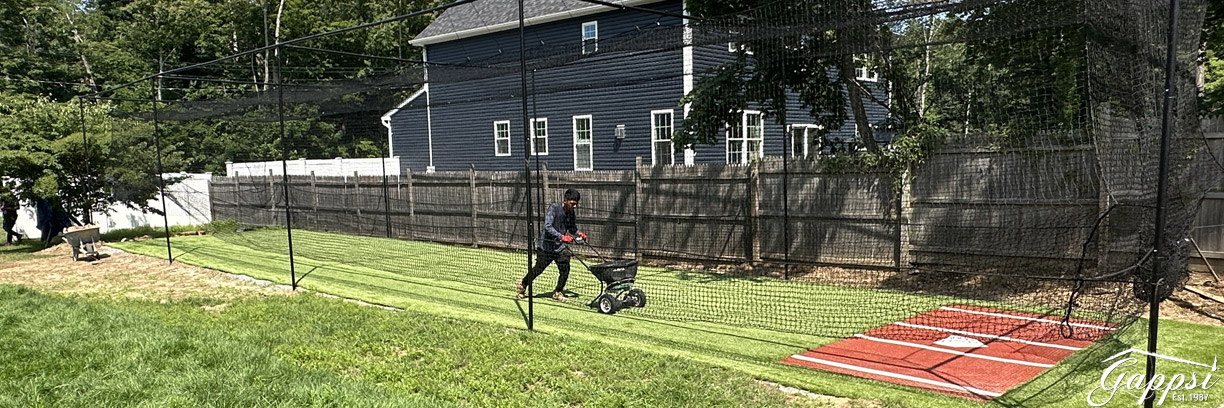 Above-Ground vs In-Ground Batting Cages
Above-Ground vs In-Ground Batting Cages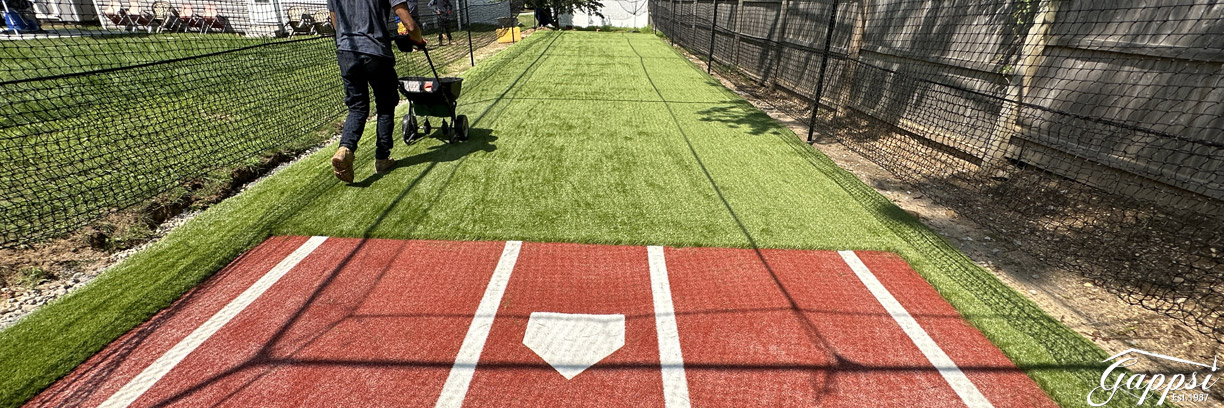 What Type of Netting Do You Need? What Twine Size is Right?
What Type of Netting Do You Need? What Twine Size is Right?
 Sport and Game Line Options
Sport and Game Line Options Putting Green with Synthetic Turf
Putting Green with Synthetic Turf Our latest Basketball Court Design and Construction is in East Hampton, NY. The family that plays together, stays together. Nothing is better after a long day of work, school, and errands than gathering together for a family pick-up game. It’s quality time that keeps you healthy and happy.
Our latest Basketball Court Design and Construction is in East Hampton, NY. The family that plays together, stays together. Nothing is better after a long day of work, school, and errands than gathering together for a family pick-up game. It’s quality time that keeps you healthy and happy.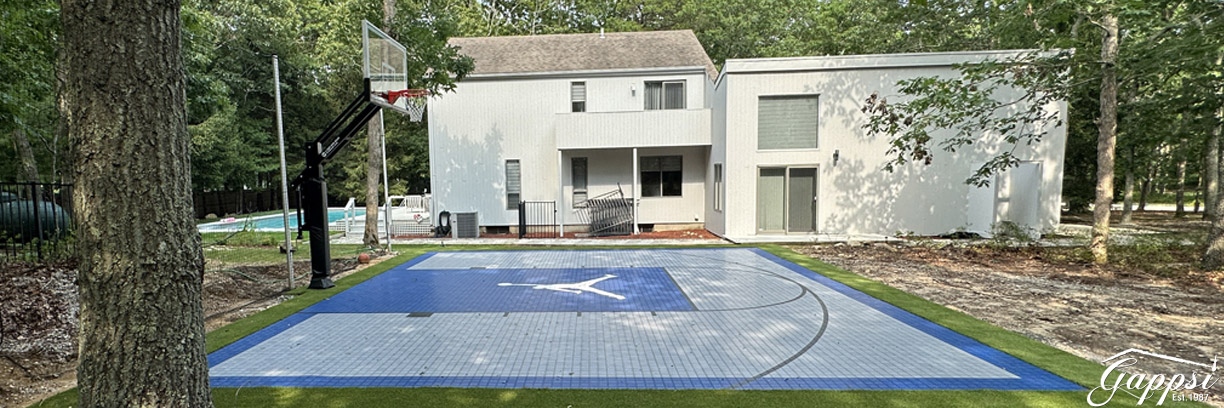 We custom build 36’, 60’, or full-sized 78’ sports game courts where you can enjoy tennis, pickleball, or other racquet sports at home with your family. We are ready to customize any court to match your needs.
We custom build 36’, 60’, or full-sized 78’ sports game courts where you can enjoy tennis, pickleball, or other racquet sports at home with your family. We are ready to customize any court to match your needs. What can Gappsi design for you? You do not have to pick just 1 anymore!
What can Gappsi design for you? You do not have to pick just 1 anymore! How would you like a custom pickleball sports game court or multi-sport game court? Is your community center or backyard missing something? With the right planning and preparation, you could have a sports court installed so everyone can play whenever they want! There are many different types of game courts to choose from including basketball courts, tennis courts, pickleball courts, futsal courts, volleyball courts, hockey flooring, gym flooring, putting greens, and shuffleboard courts. You can even have a custom-made multi-sport court designed specifically for your home, community center, school, or office. Installing a court is a great way to get exercise and have fun at the same time. Whether you are a serious athlete or just looking for some fun recreational activities to enjoy with your family, friends, or coworkers, a game court is the perfect addition. We offer several
How would you like a custom pickleball sports game court or multi-sport game court? Is your community center or backyard missing something? With the right planning and preparation, you could have a sports court installed so everyone can play whenever they want! There are many different types of game courts to choose from including basketball courts, tennis courts, pickleball courts, futsal courts, volleyball courts, hockey flooring, gym flooring, putting greens, and shuffleboard courts. You can even have a custom-made multi-sport court designed specifically for your home, community center, school, or office. Installing a court is a great way to get exercise and have fun at the same time. Whether you are a serious athlete or just looking for some fun recreational activities to enjoy with your family, friends, or coworkers, a game court is the perfect addition. We offer several 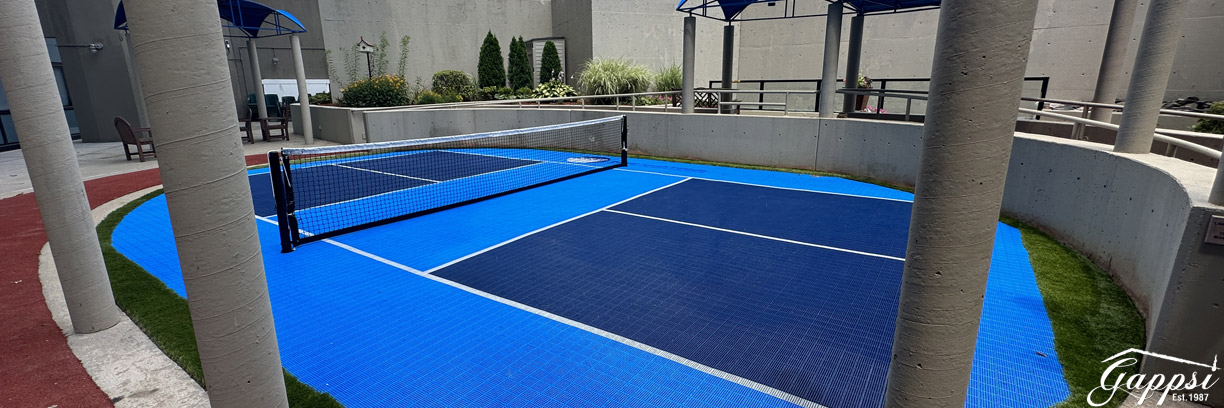 Landscape Features Around Sports Game Courts
Landscape Features Around Sports Game Courts